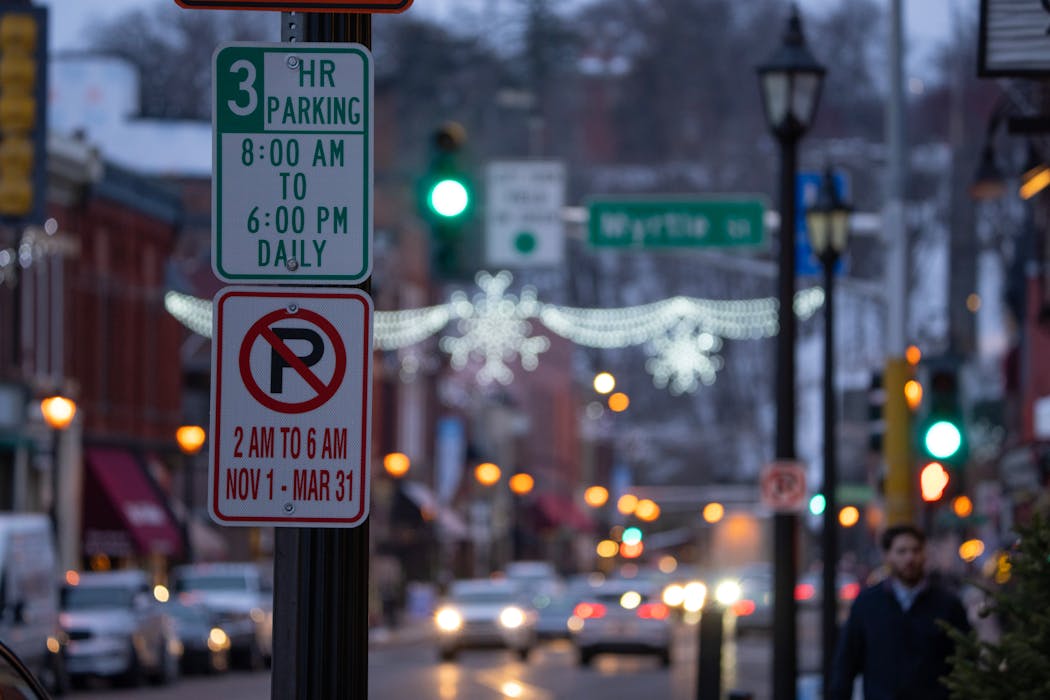Cautiously, carefully, the city of Stillwater wants to suggest something: Maybe it's time to cut back on the free parking.
The popular river town loses about $50,000 a year on its constellation of downtown public parking spots scattered across 18 surface lots and the 2nd Street parking ramp. Most of the 2,000 spaces are free, with about a quarter charging a flat fee of $3 to $5 for 12 or more hours.
"It's terrible," said Mayor Ted Kozlowski, of the city's parking. It's bad for residents and downtown employees, he said, and the lack of flexibility means someone coming in for a quick cup of coffee has mostly the same options as someone parking overnight for a weekend along the St. Croix River.
A proposal from the city's Downtown Parking Commission would use a parking app to start charging for about 60% of the public spaces. Even though the city has already purchased the equipment to get the app going, it won't happen soon.
"I envision this taking a long time to get sorted," Kozlowski told the City Council last week. "I can't imagine we're going to come in heavy-handed. I think we move cautiously with this."
Stillwater Community Development Director Tim Gladhill agreed, saying he'd like to get more public feedback. The parking commission meets Thursday to discuss the latest version of the plan.
On the busiest weekends of the year, when tourists descend on the river town for events including the Stillwater Harvest Fest and the World Snow Sculpting Championship, parking is never easy. With the river to the east, and bluffs or steep hills to the north, west and south, there's not a lot of room available to add more spots close to Main Street.
According to city data, it collected enough parking revenue to cover costs just twice in the past 10 years. The system costs about $450,000 a year including capital depreciation, Gladhill said. The city collects about $100,000 from the ramp and $300,000 from its paid spots. Gladhill said the city could afford to make all parking free only if it raised property tax rates by 3%, or about $50 on a median valued home. Making parking improvements would require more tax increases, he said.
The Parking Commission has instead proposed using the Passport app, the same one used in St. Paul and Hudson, Wis., to charge for some of the spots that are currently free. The app allows parkers to pay for increments of time as short as 15 minutes. It uses a vehicle's license plate to keep track of who's paid. A city vehicle with a license plate reader would circulate through town. The license plate reader isn't connected to law enforcement, and the Stillwater Police Department wouldn't use the data, Gladhill said.
Gladhill said that the city has purchased a new license plate reader, and that the Passport system could be up and running by May 1.
The proposal from the parking commission is flexible, Gladhill said, but he recommended the City Council consider charging for all parking spots between Main Street and the St. Croix River. Some of the other options being considered include free parking before 10 a.m., free short-term loading zones, and some kind of arrangement for downtown employees.
Kozlowski wondered if a local pass could be made available, something like a monthly payment for employees and downtown residents. Gladhill said that it could be done, but that the administrative burden on city staff should be considered. It might be easier just to leave 40% of all parking free, he said, with the understanding that locals would know where the free parking is.
The parking issue has quickly drawn the attention of downtown businesses. So far, so good, said Amanda Edwards, assistant general manager at Lolito Cantina, a bustling eatery on Main Street.
"The plan they have right now is pretty comprehensive," she said. "They're trying to take their time, and they're not just going about it quickly."
She liked the discussion on finding parking spots for downtown employees, but it's also about the visitors and tourists and special situations such as helping someone who needs to stay overnight after drinking, she said.
"It's going to be a good thing as long as we continue to have an open conversation," she said.

Want to share info with the Star Tribune? How to do it securely

'Safe recovery sites' would offer syringes, naloxone and more to people using drugs. The plan could be in peril.
New Minnesota GOP leaders seek peace with party's anti-establishment wing

Who is Republican Lisa Demuth, Minnesota's first House speaker of color?


